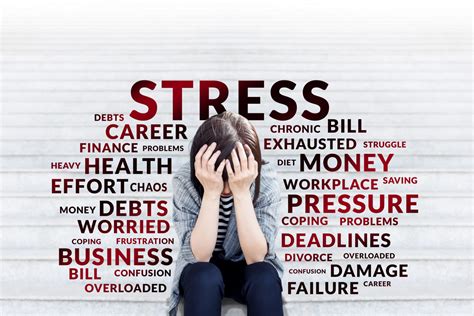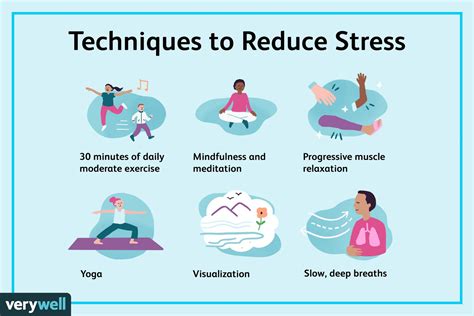Intro
Reduce anxiety with 5 stress reduction tips, including mindfulness, relaxation techniques, and self-care strategies to manage stress, improve mental well-being, and boost emotional health.
Stress has become an integral part of our daily lives, affecting not just our mental health but also our physical well-being. With the constant pressure to perform, meet deadlines, and balance personal and professional responsibilities, it's easy to get caught up in a cycle of anxiety and tension. However, chronic stress can have severe consequences, including decreased productivity, strained relationships, and a weakened immune system. It's essential to recognize the importance of managing stress and taking proactive steps to reduce its impact on our lives. By incorporating simple yet effective stress reduction techniques into our daily routine, we can improve our overall quality of life, increase our resilience, and enhance our ability to cope with challenges.
The benefits of stress reduction are numerous, ranging from improved mood and sleep quality to increased focus and energy levels. When we're able to manage stress effectively, we're better equipped to handle the demands of modern life, build stronger relationships, and pursue our goals with clarity and purpose. Moreover, reducing stress can have a positive impact on our physical health, lowering blood pressure, and reducing the risk of chronic diseases like heart disease and diabetes. By prioritizing stress reduction and making it a core part of our self-care routine, we can unlock a more balanced, happy, and fulfilling life.
In today's fast-paced world, it's easy to get caught up in the hustle and bustle of daily life and neglect our own well-being. However, it's crucial to recognize that taking care of ourselves is not a luxury, but a necessity. By investing time and effort into stress reduction, we're not only improving our own lives but also becoming more productive, creative, and supportive members of our communities. Whether we're dealing with work-related stress, personal struggles, or simply the pressures of modern life, there are many effective techniques and strategies that can help us manage stress and achieve a greater sense of calm and well-being.
Understanding Stress and Its Effects

Recognizing Stress Triggers
To manage stress, it's crucial to identify and understand our personal stress triggers. These can range from work-related pressures and financial concerns to personal relationships and health issues. By recognizing our stress triggers, we can develop targeted strategies to mitigate their impact and reduce our overall stress levels. This may involve setting boundaries, prioritizing tasks, or seeking support from friends, family, or mental health professionals.Effective Stress Reduction Techniques

- Deep breathing exercises: Focusing on slow, deliberate breaths can calm the mind and body, reducing stress and anxiety.
- Meditation and mindfulness: Practicing mindfulness and meditation can help us stay present, reducing worries about the past or future.
- Physical activity: Engaging in regular exercise can reduce stress hormones, improve mood, and enhance overall well-being.
- Journaling: Writing down thoughts and emotions can help process and release stress, providing a healthy outlet for emotions.
- Social connection: Building and maintaining strong social connections can provide emotional support, reducing feelings of loneliness and isolation.
Implementing Stress Reduction into Daily Life
Incorporating stress reduction techniques into our daily routine can be simple and effective. This may involve starting the day with a short meditation session, taking regular breaks to stretch and move, or scheduling time for hobbies and activities that bring joy and relaxation. By prioritizing stress reduction and making it a core part of our daily routine, we can improve our resilience, enhance our mood, and increase our overall sense of well-being.Additional Stress Reduction Strategies

- Yoga and tai chi: Practicing these mind-body exercises can combine physical movement with deep breathing and meditation, reducing stress and improving flexibility.
- Aromatherapy: Inhaling essential oils like lavender and chamomile can promote relaxation, reduce anxiety, and improve sleep quality.
- Listening to music: Soothing music can calm the mind and body, reducing stress and promoting relaxation.
- Spending time in nature: Connecting with nature can reduce stress, improve mood, and enhance overall well-being.
- Getting enough sleep: Prioritizing sleep and maintaining a consistent sleep schedule can help regulate stress hormones, improve mood, and enhance cognitive function.
Overcoming Stress and Achieving Balance
Achieving balance and overcoming stress requires a holistic approach, incorporating physical, emotional, and mental well-being. By prioritizing stress reduction, building strong relationships, and engaging in activities that bring joy and fulfillment, we can create a more balanced, happy, and healthy life. This may involve setting boundaries, learning to say no, and prioritizing self-care, as well as seeking support from friends, family, or mental health professionals when needed.Conclusion and Next Steps

As we move forward, it's essential to prioritize stress reduction and make it a core part of our self-care routine. This may involve seeking support from friends, family, or mental health professionals, as well as exploring new stress reduction techniques and strategies. By taking proactive steps to manage stress and promote relaxation, we can unlock a more balanced, happy, and healthy life, and achieve our full potential.
What are the most effective stress reduction techniques?
+Some of the most effective stress reduction techniques include deep breathing exercises, meditation and mindfulness, physical activity, journaling, and social connection.
How can I incorporate stress reduction into my daily routine?
+Incorporating stress reduction into your daily routine can be simple and effective. Try starting the day with a short meditation session, taking regular breaks to stretch and move, or scheduling time for hobbies and activities that bring joy and relaxation.
What are the benefits of stress reduction?
+The benefits of stress reduction are numerous, ranging from improved mood and sleep quality to increased focus and energy levels. Reducing stress can also have a positive impact on physical health, lowering blood pressure, and reducing the risk of chronic diseases.
How can I prioritize stress reduction and make it a core part of my self-care routine?
+Prioritizing stress reduction involves recognizing the importance of managing stress and taking proactive steps to reduce its impact on your life. This may involve seeking support from friends, family, or mental health professionals, as well as exploring new stress reduction techniques and strategies.
What role does sleep play in stress reduction?
+Getting enough sleep is essential for stress reduction, as it helps regulate stress hormones, improve mood, and enhance cognitive function. Prioritizing sleep and maintaining a consistent sleep schedule can help reduce stress and promote overall well-being.
We hope this article has provided you with valuable insights and practical tips for managing stress and achieving a greater sense of calm and well-being. If you have any further questions or would like to share your own stress reduction techniques, please don't hesitate to comment below. Remember, taking care of your mental health is essential, and there are many resources available to support you on your journey to a happier, healthier life. Share this article with friends and family, and let's work together to prioritize stress reduction and create a more balanced, supportive community.
